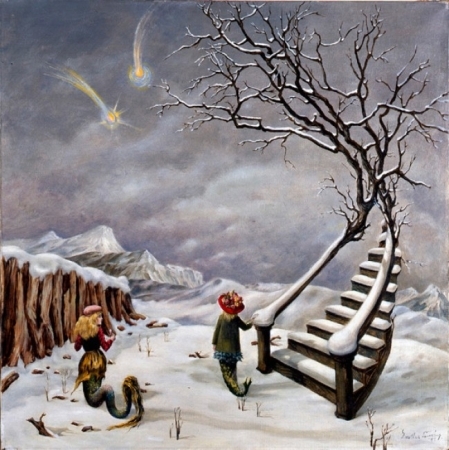
The grand finale of our Winter 2018 issue is Abhishek Sengupta‘s brilliantly Byzantine and Borgesian short story “The Forbidden Book of Uziah Greiss.”
{ X }
ABSTRACT
HAVING WORKED AS A LIBRARIAN in the Egyptian National Library and Archives (ENLA) for forty long years, visiting it for ten years as an ex-librarian subsequent to his retirement, and concentrating on reading each book housed there thrice, Uziah Greiss discovered that the 13013th word in each book is a number. Always. Without exception.
He also noted that although they appeared in different formats, each one of them was a different number (or a sign denoting a number, or terms we could map numerically). For example, in a book named A History of Martyrdom, the 13013th word is “gross”. It appears in the sentence ‘A gross misconduct on the part of the king announced the beginning of war.’ Numerically, the word “gross” stands for one dozen of dozens, or more simply, the number 144.
After years of studying, Greiss came to another startling conclusion: each number appearing as the 13013th word in a book was unique and appeared only once throughout all books ever written. Never repeated.
This synopsis attempts to uncover, as well as understand, the only (and yet, incomplete) text ever written by Uziah Greiss, which is as much of an enigma as it is a catalogue of his finding.
{ X }
INTRODUCTION
Let it be known that this is my final attempt at publishing the short synopsis of The Forbidden Book of Uziah Greiss (that is not the real name of his book, but then, his manuscript had no name – real or otherwise, and it remained incomplete for someone killed him before he could complete it). All my earlier attempts at writing and publishing the synopsis have met with failure in some mysterious circumstances, but I promise to stay true to the history of writing this synopsis by recording my failures as well. So, let me start by quoting the circumstances leading to each of those failures.
{ X }
Attempt # 1: I completed the synopsis in my first attempt. A publisher in town showed interest in it. I had been traveling on a bus with my completed manuscript when I suddenly started feeling drowsy. Although not in the habit of falling asleep on a bus, that day I did. On waking up, I found my bag, which sat on my lap and contained the manuscript, had been stolen.
{ X }
Attempt # 2: I stumbled half-way through the synopsis when the news broadcast confirmed reports of war breaking out. My wife claimed the city we stayed in was not safe anymore, which happened to be true. So, we moved to a different city, one supposed to be safer. When I unpacked my belongings, however, I could no longer find my half-finished synopsis.
{ X }
Attempt # 3: A letter arrived when I was about to complete the synopsis. My wife opened it. A clear warning surfaced, attempting to prevent me from trying to publish my synopsis. It told grave consequences awaited my family and me if I tried. The sender’s name didn’t figure anywhere. I didn’t want to pay much heed to an anonymous warning, but my wife was reluctant. She said she was afraid for our son’s life. She tore up the pages on which I had been writing the synopsis.
{ X }
Attempt # 4: I started writing the synopsis in extreme secrecy this time. I didn’t mention it to anyone, not even my wife. One day, when my wife and son went to the market, I received a phone call. The voice on the other end claimed my wife and son had been in an accident and were admitted to the nearest hospital. By the time I reached the hospital, it was too late. Both were declared dead. When I returned home a broken man, I found someone had broken into my home. The synopsis I was working on was gone.
Continue reading “The Forbidden Book of Uziah Greiss” – Fiction by Abhishek Sengupta








